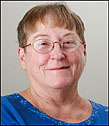
|
View from the Pew
Mary Adamski
|
ASSOCIATED PRESS
Gene Robinson, second from right, the openly gay bishop of New Hampshire, hugs a fellow congregant during a Sunday service at St. Stephen's Field in Canterbury, England. The service, an alternative to the Lambeth Conference's Sunday service held earlier at Canterbury Cathedral, was held to celebrate the gifts of lesbian, gay, bisexual and transgender Christians in the Anglican Communion.
|
|
Anglicans skirt split
Some of the Americans just back from the summit meeting of their global organization had expected to be walking wounded because they've incited the ire of peers from around the world.
![[art]](artpew01b.jpg)
Robert Fitzpatrick:
He attended a large meeting of Anglican bishops
|
|
But the wise - or wily - chief corporate executive crafted a program of camaraderie and team-building that defused confrontation, at least for a while.
That's a simplistic, secular world view of the Lambeth Conference in Canterbury, England, which adjourned Sunday after 20 days. Hawaii Episcopal Bishop Robert Fitzpatrick attended the meeting of 670 bishops of the Anglican Communion, an organization of 38 self-governing national churches with 77 million members, the third-largest Christian religious group in the world.
"There was no anger. ... It was a nonanxious moment," said Fitzpatrick, who described the structure of group meetings designed to help the top clerics mingle and listen to each other. They gathered in small "indaba" groups to hear about problems and ministries they share, dealing with hunger, disease, violence, lack of education and employment, the effects of global warming and environmental changes. "We were exchanging information, saying, 'This is what it means in the industrialized West,' and hearing, 'This is what it means in the Sudan.'
ASSOCIATED PRESS
Anglican bishops from around the world file into the Canterbury Cathedral for their Sunday service in Canterbury, England. The bishops have turned to the enormous task at the heart of their once-a-decade summit: trying to keep the Anglican family from breaking apart over the Bible and homosexuality.
|
|
"So by the time we got to the hot topic, you found yourself disagreeing with a human being you could understand and relate to, not arguing on a broader band," Fitzpatrick said.
The hot topic is how does the church deal with homosexuality. The Episcopal Church in the United States approved the ordination of an openly gay bishop in 2003. Not only that, but the American church said it's time to design a service to be used in blessing same-sex unions.
The firestorm has raged ever since, with conservative Anglican churches wanting the American branches - Canada, too - pruned from the tree. Or wanting to cut themselves off and start a new tree. The top bishops of each national church, called primates, asked the Americans last year to back off on both steps. Many are the exchanges of not very Christian expressions.
Fitzpatrick said Archbishop of Canterbury Rowan Williams "did a masterful job" by structuring the Lambeth gathering. "It was means to have conversations without degrading into legislative sessions." No resolutions were passed to condemn or affirm.
As they headed for home, Williams urged the U.S. church to maintain a moratorium against any more gay ordinations and against blessing same-sex unions.
The reason that Williams' firewall against rancor held up was that 200 conservative bishops boycotted the Lambeth session. And at their own meeting, they affirmed the conclusion of the last Lambeth Conference 10 years ago, that homosexual conduct is incompatible with the Bible.
Each of the Anglican branches went home with reports to mull over. They will consider proposals that would leave them less autonomous and would create an orthodoxy gauge that the church has never had. The proposals are to establish a "covenant" by which they would identify basic principles and agree to be bound by them. They would establish a "forum" that would judge whether any given church is within the bounds. There are echoes of the hierarchic style of church that Anglicans rejected when they broke off from the Roman Catholic Church nearly 500 years ago.
The struggle within the church reflects "the historic ambiguity of being Anglican," said Fitzpatrick. "We are reformed and we are catholic. We are liberal and conservative.
"Our tradition includes people who are conservatively Biblical, literalist" in interpreting the Scriptures, said the Hawaii bishop.
"There are those folks who see full inclusion as an issue of justice and have the intention to expand the ministry to all people." Many Americans "come from the tradition of former Presiding Bishop Ed Browning, that there are no outcasts.
"There are those who are interested in holding the Body of Christ (church) whole."
Fitzpatrick said, "Now is the time to edge back and listen to the world."

